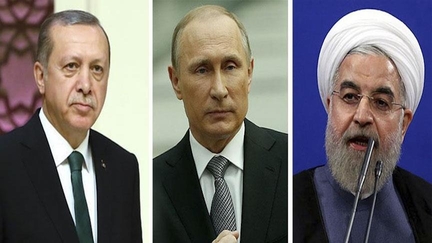ANALYSIS – Sochi summit, a sudden turn of tides?

Turkish, Russian, Iranian presidents’ upcoming meeting about Syria draws attention
ANKARA
International actors involved in the Syria crisis are keenly waiting for an upcoming summit involving the presidents of Turkey, Russia and Iran.
Recep Tayyip Erdogan, Vladimir Putin and Hassan Rouhani will gather on Wednesday in Russia’s coastal city of Sochi to discuss the Syrian settlement process, particularly the joint work from the Astana talks.
Turkey and Russia, together with Iran, are the guarantor countries which brokered a cease-fire in Syria in December 2016, leading to the Astana, Kazakhstan talks, which ran parallel to UN-backed discussions in Geneva to find a political solution to the six-year war.
But, what happened to make these three leaders, who back different sides in Syria’s civil war, come together for the first time? Is the timing of this summit a coincidence?
Bashar al-Assad regime forces on Nov. 3 retook the eastern Syrian city of Deir ez-Zour from the Daesh terrorist group in a Russian-backed operation.
Moscow, an ally of Assad, has supported the regime since the beginning of the conflict in 2011, and deployed arms and troops in the war-torn country to conduct a campaign against Daesh, in cooperation with Iran.
Turkey, having a 911-kilometer (560-mile) border with Syria, has long suffered from Daesh’s terror attacks in its cities and also from cross-border gunfire and rocket attacks.
In 2015, Ankara let the U.S.-led coalition use its Incirlik Air Base in southern Turkey to launch operations against Daesh. Turkish warplanes also struck Daesh targets in Syria.
Turkey’s Idlib operation and Operation Euphrates Shield — which saw the Free Syrian Army, backed by Turkish forces, clear Daesh from territory in northern Syria — showed how Ankara was resolute in its fight against the terror group.
President Erdogan said on Friday: “The Idlib operation is continuing as planned.
“Turkey, Russia and Iran came a substantial way in establishing a common attitude towards developments in the region.”
However, he added there were still many issues the three countries could not agree on.
Turkey has pushed the U.S. to make sure the PKK/PYD and PKK/YPG are not present in certain parts of Syria liberated of Daesh.
Side deals
However, a BBC report drew reactions after showing a deal was struck between Daesh and the SDF, a U.S.-backed force that consists largely of PKK/PYD terrorists.
The Pentagon defended the deal to allow hundreds of Daesh terrorists to escape the besieged city of Raqqah.
Although Ankara reiterates that there is no difference between the PKK, YPG and PYD terrorist organizations, the U.S. and the coalition have largely ignored the PYD/YPG links to the PKK, which the U.S., EU, and Turkey list as a terrorist group.
Most recently, the PKK/PYD, after declaring victory in Raqqah, released a video dedicating the triumph to Abdullah Ocalan, the convicted PKK terrorist leader jailed in Turkey since 1999.
Erdogan went on to say the U.S. had “disappointed” Turkey since the beginning of Syrian crisis for not keeping its promises.
“We are well aware that the U.S., who undermines Turkey’s operations both against Daesh and the PYD, wants to carry out a scenario through these organizations,” he added.
It appears that despite their different views in the region, Turkey, Russia and Iran have more common goals in Syria, leaving the U.S. behind since the beginning of Astana talks early 2017.
“There is a growing assessment that the U.S. is using both Daesh and the PYD-YPG as an excuse to remain in eastern Syria as a potential counterweighing force against the Russian-Iranian presence,” Ibrahim Kalin, Erdogan’s aide wrote in Turkey’s Daily Sabah newspaper.
While the stakeholders of the Astana talks have taken concrete steps regarding Syria, have the options of the U.S. narrowed?
It is unknown yet whether Turkey, Russia and Iran will agree on a joint statement on Syria following the summit.
However, it seems likely they will reiterate their strong commitment to the sovereignty, unity and territorial integrity of Syria.